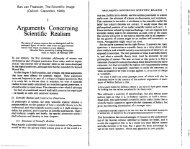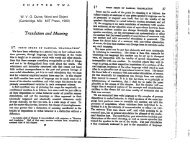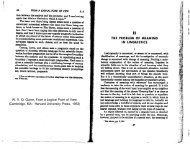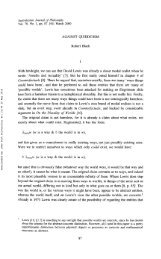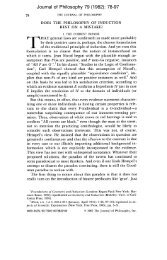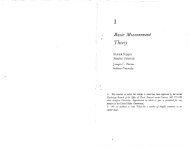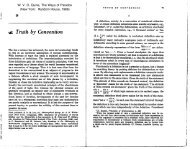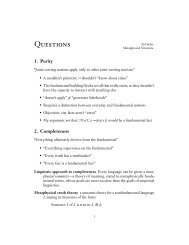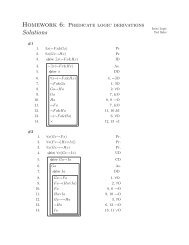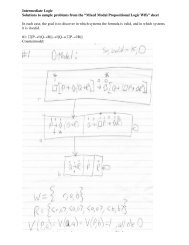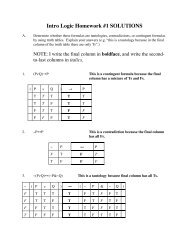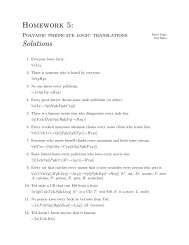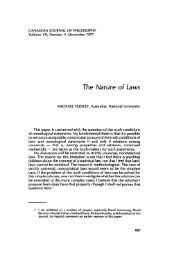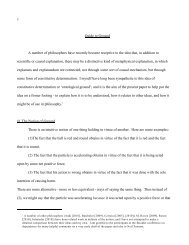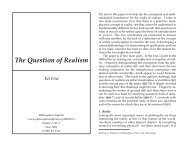Dummett - Wittgenstein's Philosophy of Mathematics.pdf - Ted Sider
Dummett - Wittgenstein's Philosophy of Mathematics.pdf - Ted Sider
Dummett - Wittgenstein's Philosophy of Mathematics.pdf - Ted Sider
You also want an ePaper? Increase the reach of your titles
YUMPU automatically turns print PDFs into web optimized ePapers that Google loves.
MICHAEL DUMMETT<br />
is true, or that a counterfactual may be true when there is nothing<br />
in virtue <strong>of</strong> which it is true, that is, nothing such that if we<br />
knew <strong>of</strong> it we should regard it as a ground for asserting the<br />
counterfactual. But he may respond by denying that these con-<br />
sequences follow; rather, he adduces it as a consequence <strong>of</strong> the<br />
validity <strong>of</strong> the law that there must be something such that if<br />
we knew <strong>of</strong> it we should count it as a ground either for asserting<br />
rIf it had been the case that P, then it would have been the<br />
case that OQ or for asserting rIf it had been the case that P,<br />
then it would have been the case that not Q.1 For example,<br />
he will say that there must be something in which either the<br />
bravery or the cowardice <strong>of</strong> a man consisted, even if that man<br />
had never encountered danger and hence had never had an<br />
opportunity to display either courage or cowardice. If we hold<br />
that he is entitled to regard anything as a logical law which<br />
he chooses so to regard, then we cannot deny him the right to<br />
draw this conclusion. The conclusion follows from the disjunction<br />
<strong>of</strong> counterfactuals which he elected to regard as logically true<br />
in the first place, together with statements we should all regard<br />
as logically true; and in any case, he must have the right to<br />
regard the conclusion itself as logically true if he so chooses.<br />
He will thus conclude that either a man must reveal in his<br />
behavior how he would behave in all possible circumstances,<br />
or else that there is inside him a sort <strong>of</strong> spiritual mechanism<br />
determining how he behaves in each situation.<br />
Now we know from the rest <strong>of</strong> <strong>Wittgenstein's</strong> philosophy how<br />
repugnant such a conclusion would be to him; but what right<br />
would he have, on his own account <strong>of</strong> the matter, to object to<br />
this man's reaching this conclusion? It is all very well to say,<br />
"Say what you like once you know what the facts are"; but<br />
how are we to be sure that we can tell anyone what the facts<br />
are if it may be that the form <strong>of</strong> words we use to tell him the<br />
facts has for him a different sense as a result <strong>of</strong> his having adopted<br />
some logical law which we do not accept? It might be said that<br />
once we discover this difference in the understanding <strong>of</strong> a certain<br />
form <strong>of</strong> words, we must select another form <strong>of</strong> words which he<br />
does understand as we do and which expresses what we wanted<br />
to say; but how are we to know that there is a form <strong>of</strong> words which<br />
338



